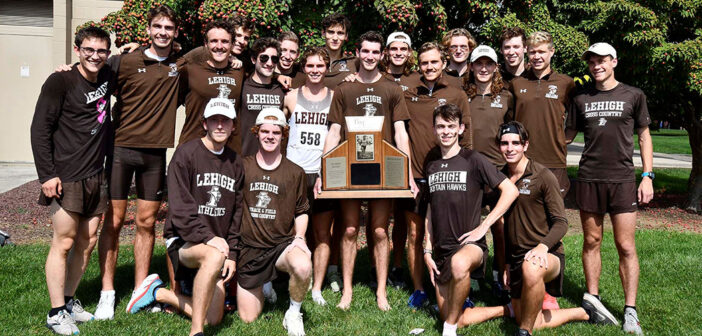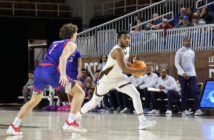The Brown and White spoke with men’s cross country seniors Kyle Burke, Avery Lederer and Nick Wilson and graduate students Seth Slavin and Brad DeMassa, to reflect on their time at Lehigh and what their next steps are after graduating in the spring.
Q: What has been your favorite memory at Lehigh?
Kyle Burke: I’ve always really liked preseason at the beginning of August. You get to hang out with all the guys and don’t have to worry about academics at that point, and you get to meet the new freshmen as well.
Avery Lederer: During COVID-19, we were all living on the same street and training together. Instead of racing, because we didn’t have a season, we made time trials for ourselves, and one of them was a 5K over at Goodman. We had to hype ourselves up for it because there were no spectators or coaches, and we were all having a lot of fun with running because we knew there were no expectations, and we all ran well because of it. I wasn’t expecting to have so much fun running in the middle of (the pandemic).
Nick Wilson: My best memory is getting to compete in Patriots last year. It wasn’t an opportunity we thought we’d have and definitely not one that we took for granted. We had it in March, which is unconventional because we are a fall sport, and it was my favorite race for a lot of reasons. It was my last race with the seniors that (were graduating), it was my first Patriots that I got to compete in, and additionally, it was run not on the cross country course but the roads because everything was snowed in.
Seth Slavin: I was fully remote last semester and didn’t participate, so coming back this semester after not having competed for a year and being back with everyone with some sense of normalcy is something I’ll remember. It reminded me a lot of how much I enjoy being on the team.
Brad DeMassa: My favorite had to be when I went on spring break with all of my teammates. We all went down to Florida two years ago, and when we were there I got to bond with the guys and get away from school.
Q: What have been some of your biggest achievements, both academically and athletically, over the years?
KB: I was proud that sophomore year I was able to be on our Patriot League roster. I was in our top seven, which are your scorers. I was also an alternate for the Mid-Atlantic Regionals. For academics, I’ve been steadily successful throughout the four years, making the Patriot League Honor Roll regularly and Dean’s List a handful of times. I’m proud of how I’ve maintained a high level of achievement with my academics while being in season during the spring, winter and fall.
AL: Academically, I’m proud of myself for doing a double major in economics and supply chain in the business school. Athletically, I’ve always been in the top five throughout all four years, and I’ve ran in every Patriot League Championship, which is good in terms of consistency.
NW: I would say my biggest achievement is how far I’ve progressed from where I was freshman year. I struggled a lot my freshman year, dealing with health stuff and transitioning to classes. (Now) being a senior and setting an example for the lowerclassmen and seeing myself in them and where I was four years ago, and where I am now, is humbling.
SS: Athletically, getting All-League, running the fifth fastest time at Paul Short and scoring at Patriots for track. Academically, my grades throughout my first few years. I almost had a 4.0 GPA in computer engineering. I also helped start a research project my freshman year by creating an app, and we did an Inquiry to Impact Project on Mountaintop for a summer too.
BD: When I first got here, and I told my dad that I’d be running cross country, he goes, “Are you sure about that? Because I don’t think you could run 8K.” One of my biggest accomplishments was proving to myself that I could actually do it, and I proved him wrong. Academically, I finished above a 3.0 grade point average in a computer science major.
Q: What obstacles did you have during your time at Lehigh, and how did you overcome them?
KB: In high school, you run a 5K in cross country, and in college you run an 8K. With that, you have to raise your mileage, which is a big jump. Freshman year I dealt with some injuries, which were tough when everything was new, and I wasn’t sure if I’d be good enough to perform at that type of level, so it was a big hit mentally. Once I was healed up, and the track came around, I was able to get my confidence back.
AL: I had two major injuries, one that wasn’t an overuse injury where I was running and stepped on the sidewalk wrong, and then I had an Achilles injury this past spring. Coming back from injuries is hard because you are trying to get in phenomenal shape again, but you can’t do so by running. But now, I’m in the best shape that I’ve been in, and I’m proud that I’ve come back from that.
NW: When I say having to deal with my health and how it impeded my career here, it’s not in the more conventional sense, it had to do with my immune system and mental health. I struggled with finding my place in school, where I belonged on the team and establishing a connection with running that was actually healthy and benefitted me, rather than something I relied on to make me feel valued. As a senior, I try to make sure everyone on the team feels valued regardless of their running contributions, and that’s something that sets me apart.
SS: I’ve had to deal with a good amount of burnout. Running high mileage, sometimes 85-95 miles a week and trying to balance 17-18 credits of engineering coursework took a toll on me some semesters. It taught me that sometimes you have to pull off the gas a little bit to be at your best. I only get the chance to be an athlete once, so I’m living more reasonably now.
BD: Athletically, I consider myself one of the lucky guys who isn’t prone to injury. But academically, being a computer science major, I’ve struggled a lot. It had me change my view on how I am supposed to do work and stay on top of a schedule, getting up at the same time every day and making sure I was getting my work done was how I overcame it.
Q: How has being a student-athlete shaped your personal development?
KB: It’s been huge because those are the people you hang out with all the time. You meet people from other teams more than you do non-student-athletes. With running, you have to be really disciplined, and it has helped carry over into the academic side of things and my personal life.
AL: Being on a team shapes so many things about your life in college because it isn’t just about you. You have individual goals academically, but everything else is tied to other people like your teammates. Socially and athletically, it’s nice to have this group of people that are working towards the same goals as you.
NW: You can’t have one without the other when I look back on my college experience; there is no looking at one in isolation without the other. I’m never just a student in any one moment, and I’m never just an athlete—there is a constant balance you have to strike. Being a student-athlete has shaped me in a sense that I simply wouldn’t be the person I am now if I didn’t have one or the other.
SS: I’ve been a student-athlete for a long time, running and doing hard classes since I was a freshman in high school, but I learned that a little bit of time is a lot of time. It’s taught me how to manage myself and how to triage responsibilities. The reality is, more is not always better. Over the years, it’s gotten easier, and easier to balance more things, so moving forward in the working world, it will be a lot easier of a path.
BD: As a student-athlete, the scheduling changed the way I used to be. Once I had athletics, it helped me segment out my day over my college career.
Q: What are your plans for after graduation?
KB: I recently accepted a full-time position at Amazon as a software engineer, and I’ll be doing that up in Boston starting next August.
AL: I don’t know the answer to it. I want to stay in shape, and I don’t know if it’s competing at a high level or for the fun of it, but I definitely want to be able to set more goals. With running, you could decide to train for a marathon, and I might want to do triathlons. It’s a question of how competitive I want to be about it. (Taking a fifth year) doesn’t make sense for me academically. I’m searching for jobs right now in the Philadelphia and New York areas, and I’m not looking forward to not having teammates to train with, so if I could find clubs in the cities to train with, that would help me stay motivated.
NW: My plans are in flux. I plan on being here next year and using my eligibility that COVID-19 granted me. Right now, I’m thinking about a master’s program at Lehigh. I know I’m going to be running next year, and I’m looking forward to another good year.
SS: I’m starting off as a manager and a senior systems engineer for a startup company and developing a system apparatus for the crane industry. It’s been a dream of mine to come out of college working on a robotics startup.
BD: At the end of last year, graduating with my computer science degree, I was in the limbo stage of staying at my part-time job and going back to school. I decided to stay for a technical entrepreneurship master’s and it’s allowed me to use my skills in a very productive way to create things. Looking forward to after this year, I’m going to stay local at a small start-up working with Seth.






Comment policy
Comments posted to The Brown and White website are reviewed by a moderator before being approved. Incendiary speech or harassing language, including comments targeted at individuals, may be deemed unacceptable and not published. Spam and other soliciting will also be declined.
The Brown and White also reserves the right to not publish entirely anonymous comments.